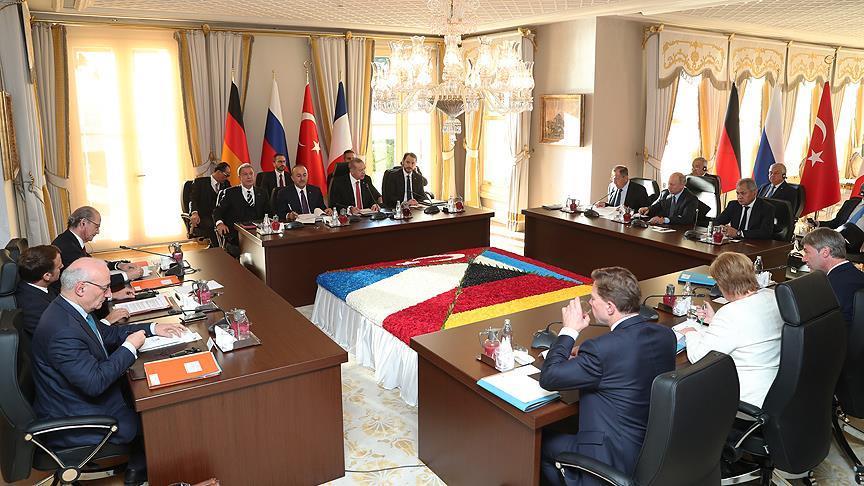1. The Istanbul summit on Syria between Turkey, Russia, Germany, and France ended on Saturday. The summit, attended by Russian President Vladimir Putin, German Chancellor Angela Merkel, and French President Emmanuel Macron, lasted two hours and 45 minutes. Anadolu News Agency quoted Turkish President Erdogan as saying, “the summit aimed at reaching a full cease-fire to halt bloodshed in Syria.” He said Astana peace process for the Syrian conflict had set an example for the international community, adding that Turkey, Russia, Germany, and France had "fruitful and sincere" consultations during Saturday's summit in Istanbul. Staffan de Mistura, the UN Special Envoy to Syria also attended the summit.
2. On Saturday, Turkey’s Defense Minister met with his Russian counterpart in Istanbul ahead of a four-way Syria summit. According to Anadolu News Agency, the two ministers exchanged views on the latest situation in Idleb, as well as regional security during their talks, according to Turkish defense sources who asked not to be named, due to restrictions on speaking to the media.
3. Syria’s permanent representative to the UN, Dr. Bashar al-Jaafari reaffirmed Syria’s determination to extend its sovereignty over the province of Idleb and that Syria will not allow Idleb to become “new caves for terrorists.” SANA quoted Jaafari as saying, “Idleb is an integral part of Syria and the Syrian state is determined to fully extend its sovereignty over the area when it deems it appropriate, and that this act is a right guaranteed by the UN Charter and international law, with an opportunity for political and diplomatic work.” He added that the Syrian state will not allow Idleb to become “new Tora Bora caves for terrorists” and this matter is settled.
4. SANA reported that on Saturday, the meetings of the Executive Committee of the World Peace Council kicked off at Damascus University with the participation of delegates from 40 Arab and foreign countries. The President of the World Peace Council, Maria do Socorro Gomes, spoke at the conference. She affirmed that holding the meeting of the Executive Committee of the World Peace Council in Syria sends a message to all countries to condemn the foreign interference in the state’s affairs and denounce terrorist organizations which have tried to destroy Syria, a country which loves peace and is known for its security and safety throughout history.
5. Several local councils in the northern Aleppo countryside declared their refusal to work on the new winter time, in order to avoid differences with Turkish timing. According to opposition website Al-Hal, the local council of the city of Azzaz, north of Aleppo, said in a statement that it will keep the daylight saving time, "due to direct relations with the Turkish state in the field of trade and public institutions and crossings, and to avoid a difference in dates and to facilitate the movement of work.”
6. On Friday, Syrian regime artillery killed seven civilians in Idleb. This is the highest loss of life since a Russian-Turkish deal last month to prevent a regime assault on the province, a rescuing agency said. Zaman al-Wasl reported that three children were among those killed in a village in the country's last major rebel bastion, according to the White Helmets. Also on Friday, thousands of people came out onto the streets of rebel-held areas to rally against the Assad regime. Demonstrators held up the three-star flag of the Syrian revolution and placards recalling the first days of the Syrian revolution in 2011, saying their goal is the toppling of the Assad regime and stopping the Russian aggression.
This article was edited by The Syrian Observer. Responsibility for the information and views set out in this article lies entirely with the author.


